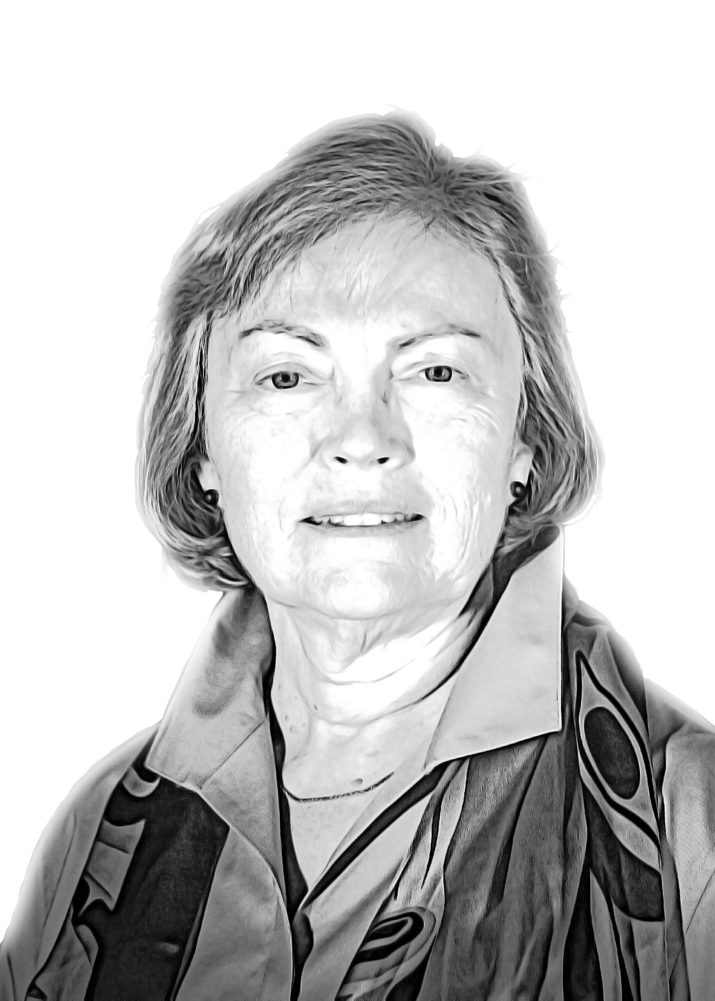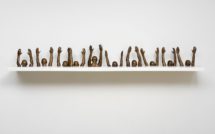
Becoming the Object of Inquiry in Ceausescu’s Romania: An Interview with Katherine Verdery

Anthropologists are fond of talking about the importance of “being there.” But for scholars of the former Eastern bloc, “there” is an increasingly remote place, accessible only through aging memories and decaying artifacts. Katherine Verdery is among the foremost scholars of Eastern European communism and post-communism. In an award-laden career spanning more than four decades, she has undertaken extensive fieldwork in Romania to reflect on life under the communist regime and the various displacements—of identity, land, bodies—that attended its quick and spectacular collapse. Today, she spends most of her time in New York, and more particularly at the City University of New York Graduate Center, where since 2005 she has been the Julien J. Studley Faculty Scholar and Distinguished Professor of Anthropology. Verdery and I met via video chat approximately a month before her latest book, My Life as a Spy: Investigations in a Secret Police File, was published in May 2018 by Duke University Press. It is her eighth book (if you don’t count the three edited volumes) and her most personal. In it, Verdery grapples with the massive surveillance file that the Romanian authorities accumulated on her during the field studies she conducted between 1973 and 1988. Verdery received the file in 2008, and though unsurprised to learn that she had been the target of intelligence-gathering, she was shocked to learn who exactly had helped gather it. Friends and acquaintances—trusted interlocutors—had supplied much of the intel that the Securitate used to document the doings of an anthropologist they were convinced was in fact a western operative. My Life as a Spy is a study of the self as studied by others. Written by a veteran anthropologist, it promises incisive ruminations on ethnography, the Cold War, communist and post-communist society, government surveillance, and the uncanny feeling of “being there” once more through the notes and photographs of Ceausescu’s menacing secret police.
—Kelly McKowen for EuropeNow
EuropeNow What genre is My Life as a Spy? Is it an ethnography? Is it a memoir?
Verdery There’s a paragraph in the book that says, to be honest, I don’t really know what it is. It’s part ethnography and part memoir. And it uses the memoir to jog the ethnography, and then the ethnography to extend the memoir. It started off when I was told my secret police file was available for me if I wanted it. And at that point, one of my friends said, “You should write your memoir from this!” And so, I thought, “Yeah, I should.” So, the idea of the memoir was what started it off. But when I actually read it, I said, “I can’t write a memoir out of this. It has to be something else.” So, it’s a mix. It’s a bunch of other peoples’ views of me, but they don’t conform very much to my own views of myself. I had to stop and ask myself, “Why not? Am I just deluding myself that I think these people are wrong?” It’s got that kind of meditation along with reports of what I was actually doing.
EuropeNow Why write the book now? And why write it all?
Verdery Part of what appeals to me about this is that I feel that the phenomenon of surveillance has completely gotten out of hand and is going to continue to. Anything we can do to just make sure people think about this a little bit, think about it in different ways with different kinds of materials, becoming more self-conscious of the possibilities of surveillance in their environment and what effects it can have on a person—in this case, me—is a good idea. So, surveillance as a topic was important. Why bring it out now? I got this file in 2008, and I was writing another book. When I finished the other book, it took a long time. I just worked until it was done.
EuropeNow In 1999 you published a book called The Political Lives of Dead Bodies. In it, you show that sorting out the politics of post-socialism involved not only building new institutions but literally exhuming and moving the dead to construct meanings and identities. In My Life as a Spy, you seem to also be unearthing things long buried. Are you engaging in your own form of post-socialist exhumation? And if so, what meanings and identities are you working toward by doing so?
Verdery I am working toward my own form of exhumation, and I guess I’m struggling to come up with a way of seeing my earlier self that is sympathetic. Because I was acting really like a jerk a lot of the time when I look back at myself in the field in the 1970s and 1980s. I want to try to work toward a better self with this memoir while at the same time illuminating some things that have to do with Romania and Romanian society. So, it’s not just about me.
EuropeNow What inspired you to work toward a better a self?
Verdery How critical I was of the self I found in my fieldnotes and my letters home and things like that. I was just so cocky. I had plenty of warning from people, like in the American embassy, who held a sort of orientation for people who had come with research grants. They told us all this stuff about how you have to be really careful about everything, that every conversation can be recorded with a microphone. Most people there sort of rolled their eyes to the ceiling and said, “These are such old Cold War people—such an old Cold War mindset.” Not that the Cold War wasn’t still on. I just thought I’m more enlightened than that, and it proved, reading this thing, that I was not at all more enlightened than that, and it was folly that I thought I was.
EuropeNow The file you discovered contained approximately 2,700 pages. What kinds of documents and media were in there?
Verdery Two kinds of things. There were pieces of regular paper, 8 ½ x 12, that Europeans use, that had writing on them from different people, some of them officers of the secret police. They included some of the letters I had written that they had pulled out of the mail. There were many sources for them. Some are type-written, some are hand-written. The only other thing that’s there—and they’re not very numerous—are surveillance photographs that were taken of me or people I was with. And I include a few of those in the book. One of them is of me in my underwear in my bedroom in the hotel, where they had set up a video apparatus to see who I was sleeping with.
EuropeNow In combing through the file, who was the Katherine Verdery that was preserved there? And how did Romanian intelligence come up with this person?
Verdery Well, she was at least three different kinds of people, in different periods of my research. They always thought I was a spy, but they had different theories about what kind of spy I was. At the beginning, they were convinced I was spying for the military, and there was good reason for that because I rode my motor bike into a military base right at the beginning of my research by mistake. And after that, there were people that were convinced that I was really Hungarian. My name has a form that can be read as Hungarian, although it isn’t. And a lot of Romanians would think I was Hungarian because my name ends with a “y.” So, there was that person, who was trying to get in touch with the Hungarian minority in Romania and elicit critical statements. And then there was the person who, as they put it, was collecting sociopolitical information, which is actually a very good description of what I was doing. So, they nailed me. But from their point of view, that made me a spy because the interpretation I put on this information would not be flattering. And then finally at the end, they were convinced I was consorting with dissidents. Romania didn’t have a very active dissident movement at the end of the regime, but it did have something that happened in 1988-89, and I met a couple of the people involved in that. At the time I met them, I didn’t know that they were involved, signing letters to the president telling him that things had to change.
So, each time I came they developed a new hypothesis. And the hypotheses were also related to the places I was in. The first research was in a village in a mountainous area, and they thought I was a military spy because that’s where the military bases were. The second research was in the city of Cluj, where ethnic relations are a very big subject, and so that I would be consorting with Hungarians was their worst fear. Then the third one, going for sociopolitical information—I did that everywhere. And then the fourth one was in Bucharest, and that was where the little dissident opposition was located. So, each of these people, these “me’s,” showed up and was inserted into the police template accordingly.
EuropeNow Amid so much misinformation or misinterpretation, did you discover some things that were true or surprising about yourself or your work?
Verdery Well, basically, I came to the conclusion that in some respects they were right—if you take their definition of what intelligence work looks like. They had in one document, which I quote [in the book], “She obviously has intelligence experience. She makes her notes in multiple copies. She always puts down the question she’s asking, sets the context of the questions. She collects absolutely everything she can. She’s not focused on a specific set of question but she’s just generally inquiring. And she makes three copies of her notes, but she doesn’t keep any of them, as would be expected from someone writing a book.” So, they have their template. And there are several points in the documents, in different years, when one or another officer will say, “You have to take really good care when you’re working with her because she’s extremely competent as an intelligence person.” So, I realized that if I ever wanted a different job [laughs], I could do that.
EuropeNow How aware were you of Romanian surveillance at the time? Did you ever suspect that you were being informed on, or observed?
Verdery I had to assume that some people were informing on me. I had some suspicions about a couple of them, but on the whole, I wasn’t right about the ones that I thought might be doing it. In the first fieldwork in 1973-74 I was at my most naïve. There were a couple of points at which some Romanian would say to me, “There’s your shadow.” But mostly Romanians didn’t talk about that with me. There was one guy who was a chauffeur, and he had an enormous truck that he would drive big machinery around in. Sometimes he’d take me to the city if I wanted to pick up some coffee at the dollar store or something like that. So, one time he took me in, and as we were driving back, he said, “By the way, there’s a car that’s been following us ever since you came out of the dollar store.” So, there were people that would sometimes say something, but I tended to think, “Okay, there aren’t that many examples of this.”
But I just didn’t know. For example, my landlord in the house where I lived in the village was meeting every ten days with this officer and telling him exactly whom, supposedly, I had talked with. When I would come home at the end of the day I’d have dinner with him and his wife, and they’d say, “So, what did you do today? Have any interesting conversations?” And I’d say, “I went to so and so, and so and so, and so and so.” And I never imagined he was writing all this down, but he did. And then he was supposed to find out what I talked about with them. He was a very smooth guy, and he could say to them, “I gather that the American was visiting the other day—what was she up to?” After a little while, he got the same answers, pretty much. He would just keep telling the officers that I was interested in kinship and family. But still, I was really shocked when I saw how much stuff there was.
Later, in the 1980s, I was much more aware of being followed. More people commented on it. The operator in the hotel I stayed in, who had befriended me so I would give her cigarettes, called me up one time when I had been to Bucharest on a trip. She said, “By the way, the guys were really busy in your room while you were gone.” She described that she could hear them talking to each other and rustling around in my room. Hearing that kind of thing from multiple people made me much more conscious of what was going on.
EuropeNow Ethnographers aren’t omniscient, but at times they write as if they have at least a more or less complete understanding of their interlocutors and how they spend their time. Some of your interlocutors, however, were spending at least some of their time reporting on you. Has unveiling otherwise invisible practices and relations of informing caused you to reflect on what it is possible to know with the ethnographic toolkit?
Verdery Well, it depends on what you’re trying to know. If you’re trying to get inside the deepest thoughts of the people you’re working with, then I don’t think ethnography is necessarily the best place to begin. For example, I did a book after 1989 about the restitution of land that people had been forced to give to the collective farms. And I had no trouble having conversations with them about all kinds of things: how they were working the land they had, how much they had to pay to have it ploughed, all the problems they were encountering. And I think that what I found out was accurate. I don’t think they were just lying to me. But if I had said to them, before 1989, “Are the secret police bothering you about me?” They would have said, “No.” So, it depends really what you want to find out.
Now, two of my closest friends were reporting on me. And one of them had even told me that [she was doing so] before the communist regime was overthrown, but she didn’t want to talk about it. She just said, “Look, I have to tell you, for a year they were coming and asking me to tell them about you, and I got really tired of it. So, that’s why I didn’t want to see you when you came back.” And that’s all she had to say. When I was writing this book, I had a lengthy set of conversations with her, and she shows up in it.
EuropeNow For My Life as a Spy, you sought out and interviewed officers who helped build your file. Why did you do that?
Verdery I wanted to see what these people looked like. I’d been seeing their signatures and their summaries of me while reading this huge pile of paper. And I wanted to know who they were, even just physically. I thought maybe I’ll be able to ask them some things, but mostly I wanted to just see what the quality of the interaction would be like. I wasn’t going to assume that what they told me was necessarily true. But in the book, I use that material to reflect on how eager I was to be likeable, and how in a certain way they recruited me just as they recruited their informers. So, I came away with a much greater sense of how these guys could really get people to be informers without coercing them. Because they were unbelievably smooth. So, I thought, “Okay, this gives me a different perspective on informers.” That was a side benefit. And I asked them questions like, “Why did you go into this line of work?” And the conversation just developed from there.
EuropeNow You’re among the foremost scholarly authorities on life in Romania under, and after the fall of, the communist regime. In writing this book, were there new insights about Romanian society, Eastern European communism, or government surveillance emerged?
Verdery I think probably not. By that time, I had pretty much learned what I needed to learn about communist Romanian society. I think I learned more when I was writing the book that came before this one, which was called Secrets and Truths: Ethnography in the Archive of the Secret Police. That one has a lot more scholarly references, and I tried to make an analogy with secret societies in other parts of the world. I learned more then about the place of surveillance in the communist system. But there was one thing I decided from this book. All of the years I’ve been going there, I’ve been hearing from people about how fearsome the secret police were, and how people would lie awake at night waiting for the knock at the door. Now, this wasn’t all the way though, but especially at the beginning. And they were really frightened that they might be arrested and then interrogated, and that would be a horrible experience.
What I discovered by the end of the conversations with people was that almost everybody knew some secret police. They were their relatives, they were their neighbors. It wasn’t as if they were completely unknown. My second landlady in the village I worked in had a cousin who was a secret police guy, and he came to her house when I was away, asking if she would let him in so he could check my stuff in my room. With all of this, people were asking secret police for a lot of favors. There was a lot more interaction between them and the population than I had expected. This is all based on conversations I had with people. I have no other kind of proof, but that was interesting to me because all of a sudden, it wasn’t as if they were this terrorizing body outside daily life. They were a part of daily life.
EuropeNow My Life is a Spy is a work about government surveillance. This isn’t an issue that left the world with the communist regimes of Eastern Europe, and in recent years, particularly following the Edward Snowden case, there has been renewed interest in how— and what—information is collected by the government. We’re also increasingly concerned about corporate surveillance. Recently, we’ve been talking about Facebook and the exploitation of user data for political campaigning. Does your study have something to tell us about surveillance today?
Verdery First of all, that it’s much worse than you think. And that if you ever uncover it, you will be shocked. I remember reading an article in the New York Times several years ago by an Austrian who had decided he wanted to get his deleted Facebook pages. He asked for them and he got them. He was appalled by what had been kept by Facebook about him. So, even though you know they’re probably keeping them, you don’t think to yourself, every word you’re saying, gosh, somebody could be hanging on to this.
Another thing is that surveillance is a very important part of state-making, but the kind of state you’re talking about has implications for the kind and amount of surveillance you’ll see. So, up until lately we have had a lot more surveillance from corporate entities than from government entities—though the Snowden papers made it clear that there was plenty of the latter as well. That’s distinctive when compared with the Romanian experience, where it was entirely this government apparatus that was doing the surveillance. There are interesting differences between whether the surveillance is primarily labor-intensive, which is what I encountered in Romania, or technology-intensive, which is around us. These are all problems that are worth thinking about, and it’s very easy to do this when comparing what I learned about surveillance in one context and what we have going on around us now. I deleted my Facebook page right after I started this project. I said that this is the most extraordinary instrument of surveillance ever developed, in which people voluntarily participate.
EuropeNow We’ve become our own informers.
Verdery Yes, that’s right.
Katherine Verdery is the Julien J. Studley Faculty Scholar and Distinguished Professor of Anthropology at the City University of New York Graduate Center. She is the author of eight books, editor of three volumes, and recipient of numerous awards. Her latest book is My Life as a Spy: Investigations in a Secret Police File (Duke University Press, 2018).
Kelly McKowen is a PhD candidate in the Department of Anthropology at Princeton University. He serves on the research editorial committee of EuropeNow.
Published on July 20, 2018.




